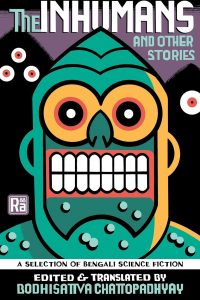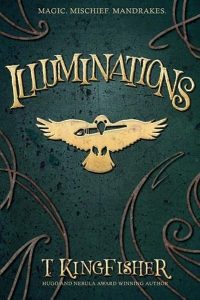Faren Miller reviews Betsy James
Roadsouls, Betsy James (Aqueduct 978-1-61976-091-2, $20.00, 394pp, tp) March 2016. Cover by Betsy James. [Order from Aqueduct Press, PO Box 95787, Seattle WA 98145-2787]
 Roadsouls, written and illustrated by Betsy James, starts with a prelude simply called ‘‘Two Stories’’, showing the main characters at key moments some years before they go on the road. Raím is ‘‘nothing but eyes and fire and bullshit, that boy – that man, not yet eighteen, red-haired, mocking the plaza girls with kisses, burning like a torch in daylight,’’ on the fateful morning when the bold young hunter leaps to a cliff that crumbles, resulting in the fall that takes his eyesight. Duuni is younger, visiting a village fair as ‘‘a brown girl in a brown smock… clinging to her mother’s hand and staring at a lion’’ (an image that continues to haunt her in various guises, throughout the book).
Roadsouls, written and illustrated by Betsy James, starts with a prelude simply called ‘‘Two Stories’’, showing the main characters at key moments some years before they go on the road. Raím is ‘‘nothing but eyes and fire and bullshit, that boy – that man, not yet eighteen, red-haired, mocking the plaza girls with kisses, burning like a torch in daylight,’’ on the fateful morning when the bold young hunter leaps to a cliff that crumbles, resulting in the fall that takes his eyesight. Duuni is younger, visiting a village fair as ‘‘a brown girl in a brown smock… clinging to her mother’s hand and staring at a lion’’ (an image that continues to haunt her in various guises, throughout the book).
In chapters one and two he’s in his early twenties, trained now as a weaver but restless (planning escape despite the blindness that makes him horribly clumsy anywhere away from the loom), while she’s a teen sequestered with the Maidens in her own village (where she has also learned to weave, though she hates the task – preferring to draw decorative animals on children’s wrists with urda paste). The scenes that follow tear them from the only worlds they know, more brutally than falling down a rabbit hole or leaving Kansas on a twister. At first it feels like death, followed by messy rebirth when each is pulled (naked) into the chaos of a Roadsoul wagon reserved for kids and the newest strays to join the caravan.
When the largest settlements are towns – estranged and isolated outposts in a primal landscape of prairie, woods, and waste – this caravan of misfits from all over the place can resemble sassy urbanites: multilingual, eclectic, and skeptical enough to dismiss magic as the realm of charlatans whose sorcery consists of duping ‘‘townies.’’ The spirit seems to manifest as casual contempt in Nine (unofficial leader of the strays, known only by her age) as she gives our refugees new nicknames: ‘‘Pillbug’’ for Duuni, ‘‘Flea Butt’’ for Raím.
Yet Nine, the Roadsouls, and the novel as a whole are still open to wonder: genuine transformations that just happen, without rituals or spells. The process animates Duuni’s drawings, in her own halting description: ‘‘I… the being is there already. I lay down the line where it is. As I draw, it changes itself.’’ Some of that mystery arises even in Raím’s series of misadventures (both with and apart from the caravan, as plotlines intertwine).
In Roadsouls, Betsy James deliberately avoids the tropes and narratives typical of long fiction (mainstream, heroic fantasy, or romance). Chapter headings and brief quotations throughout come from a wild array of other forms, as her world expresses them – from hopscotch rhymes and graffiti to chants and scribbled prayers. In this column of hints and impressions, I’ll finish by citing parts of the quote that opens Chapter 1, from an anonymous ‘‘slip of paper.’’ It begins with the blunt admission, ‘‘The dark has a language. I don’t speak it,’’ then (after five lines of stress and doubt) ends in poetry:
The dark takes my hand
as if I were deaf and blind,
and holds it to his lips.
By itself, this may not tell you much, but words and images resonate with others in the reviews that follow.






